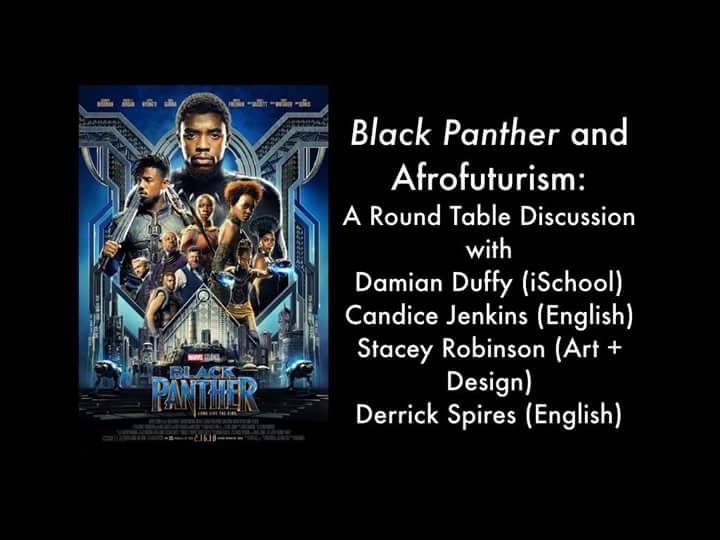Candice Jenkins, PhD, hails from Columbus, Ohio and earned a Bachelor’s Degree at Spelman College and her doctorate at Duke University. She moved to Champaign-Urbana with her family in the summer of 2014 to begin teaching at UIUC. Jenkins is an Associate Professor of English & African American Studies at UIUC, and her research specialization includes: Contemporary Black Fiction, Black Postmodernism, Gender/Sexuality Studies and African American Narrative, Black Feminist Theory and Criticism, Hip Hop and the Literary, and Black Speculative Fiction.
Smile Politely: What initially attracted you to a career in African American Studies?
Candice Jenkins: I loved to read and books got into my head and heart in a way that I could never shake (even when I tried). Actually, I arrived at Spelman thinking I would be an Economics major, but never managed to take a single Econ class, because my English classes captivated me immediately.
SP: You were awarded the prestigious National Endowment for the Humanties (NEH) Fellowship which was only awarded to only 80 individuals (of 1178 total applicants) this year. Can you explain the importance of that to our readers?
Jenkins: Given the struggle of finding funding for work in the Humanities — with so many organizations under siege, reducing budgets, operating under the threat of closure — it is vitally important to have organizations like the National Endowment for the Humanities that remain devoted to supporting scholarly and creative work in the Humanities.
To this end, the NEH Fellowship supports projects across a diverse expanse of time periods, disciplines and approaches focused on what it means to be a human being on this planet, and how we can navigate this 21st century world. Supporting such work provides a vital blueprint for new possibilities and new solutions to human problems and how we understand who we are as human beings.
And for that reason, I am honored to have had my work “Race, Class, and Bodily Vulnerability in Contemporary American Fiction of the 1980s to 2000s” selected and valued because it is work that can contribute to our larger human story.
SP: What will the fellowship allow you to do?
Jenkins: The fellowship has allowed me to take the spring semester of 2018 away from the classroom so that I can focus on completing the final revisions for my book manuscript. The book is under contract with the University of Minnesota Press and I actually have a deadline with them for midsummer, so I am very thankful to have this time to get the book completely finished and ready for publication.

SP: In your work you argue:
“At the heart of black middle-class life and literature, one finds a paradox:
bodies that are both bourgeois (privileged, socially restrained and presumed secure) and black (physically vulnerable, transgressive and assumed poor).”
Therefore, as a bridge between your own scholarship and the recent roundtable you participated in “Black Panther and Afrofuturism” I wondered:
Are the characters in Black Panther — which features characters that are both “bourgeois” and “black” — consistent with your study of black, bourgeois bodies in literature? Or do the characters in Black Panther deviate from the arguments you made in your earlier project about bodies that are both black and bourgeois?
Jenkins: I see T’Challa and Killmonger both situated within a broader trajectory of W.E.B. DuBois’ important notion of “double-consciousness,” the idea that black people experience “two warring souls in one black body.” I see these two opposing characters as embodying DuBois’ notion of that black duality — negotiating what is projected onto the black body versus their own self-understanding.”
SP: During your opening remarks a recent roundtable on “Black Panther and AfroFuturism,” you argued that Black Panther is situated in a discussion about the African American speculative tradition versus Afrofuturist traditions. Can you explain why the speculative tradition is so significant for African American literature?
Jenkins: African American literature has a long history of speculative thinking —as my colleague Derrick Spires pointed out — there has been speculative thinking about black liberation in African American literature since its inception. In the 20th and 21st centuries we have Afrofuturist and other speculative works using fantastic and futuristic devices both as a corrective to traditional genre work in science fiction and fantasy that has excluded black people from visions of the future, and in order to think about blackness, and black life, in new and complex ways.
SP: To expand the conversation beyond Black Panther, we seem to be in the midst of quite a fertile moment in African American television and film.
- Black Panther breaking box office records since it opened February 16th
- Get Out winning the Oscar for Best Original Screenplay
- Mary J. Blige nominated for Best Supporting Actress for Mudbound
- Issa Rae’s Insecure awarded for various awards including the AFI, African American Film Critics Association (AAFCA) Awards, and nominated for Golden Globe, BET Awards, Gay and Lesbian Entertainment Critics Awards
- Atlanta, Empire, Queen Sugar, How To Get Away With Murder, Grey’s Anatomy, Scandal, and lots of other cable programs and series with leading African American actors receiving critical acclaim
- Wrinkle In Time film starring media mogul Oprah Winfrey and director Ava Duvernay (both African American women) opening on March 9th
…Among other projects too numerous to name…
Stacey Robinson, one of your fellow roundtable participants, proclaimed that “We are in the midst of a Renaissance of Black Arts.” Do you agree that we are in the midst of Black Arts Renaissance?
Jenkins: Yes, I definitely agree that we are indeed in a Black Renaissance with a broad range of programming on the big and small screen that present to us complex, nuanced portrayals of black life simultaneously that we have not seen before — presented to us as humor, drama and dramedy, horror, etc.
SP: But what of literature? Can you argue that literature is experiencing this same renaissance? We see a lot of acclaim for African American non-fiction writers— memoirists, essayists like Ta Nehisi Coates, Roxane Gay, Brittney Cooper — but how is African American fiction faring?
Jenkins: I believe we are seeing that same kind of revival in fiction with so much being produced I can hardly keep up with it all — a few of my favorites are Kiese Laymon (Long Division) whose work is both speculative and Southern, Kai Ashante Wilson (A Taste of Honey) whose work is queer, black and speculative, N.K. Jemisin (The Fifth Season) and Victor LaValle (The Changeling) to name just a few. Unfortunately, literature doesn’t have the kind of popular reach that film and television does, so fewer are aware of the amazing work that is out there.
SP: As a specialist in African American literature and popular culture, I’d love for your thoughts about what explains the global response to Black Panther, i.e., $900+ million dollars earned in the first three weeks since it’s release? Why do you believe this film has been so successful? And why now?
Jenkins: First and foremost, this film has Marvel behind it. It is just a very good, high quality Marvel film and many people love Marvel filmmaking and would turn out to see this film.
Beyond that, this film speaks to African Americans’ desire to see themselves in a speculative and fantastic present and future albeit an altered present, an imagined space.
African American audiences in particular appreciate seeming themselves in varied portrayals of the Black experience be it escapist, fantasy, experimental. We respond to seeing an expansion of ourselves.
SP: Since the film’s release, you see people on social media and hear people talking about “going to Wakanda,” “meeting up in Wakanda,” referencing “Wakanda” in varied aspects of daily life.
Jenkins: Black Panther centers people who haven’t been centered in the narrative before on this scale. This is significant for communities accustomed to seeing themselves as an afterthought, marginal or absent from films altogether which has far too often in American cinema.
I also believe that global audiences are hungry for new stories and new representations that have not been depicted before.
SP: I’d also like to bounce an idea off you that might explain why Black Panther as a global phenomena. In my own grappling with this, I am wondering if you think the film’s popularity could be connected to global Obama nostalgia. And what I mean here is T’Challa’s family — like the Obamas — represent a patriotic, poised, dignified, gracious, sober, family-oriented, intelligent, respectable black family with global standing?
Jenkins: Wow, that is a really good point. I hadn’t considered it, but I do think that is a sharp observation.
SP: Watching T’Challa’s character descend from the spaceship reminded me so much of the footage of President Obama descending Air Force One.
Jenkins: Ahhhhhhh, that’s so true.
SP: … With that cool, confident stride. And recently — as the nation has responded so emotionally to little Parker, the little girl admiring Michelle Obama’s painting in the National Gallery — it struck me that some of the reason for the film’s popularity may be nostalgia for what the Obama family represented and their global impact.
Is there anything else you would like readers to think about at it relates to contemporary African American storytelling?
Jenkins: I encourage folks to just dive in. Get some & start reading. Support your local bookstores. Attend author talks on campuses. Download books on your Kindle or other devices. Just begin and don’t stop reading. There is nothing like it…nothing like being immersed in a great story.
SP: Can you name a few authors that our readers might not be aware of that they need to be reading (i.e., authors discussing complex themes in compelling ways).
Jenkins: My list of favorite book recommendations:
Kiese Laymon, Long Division
Victor LaValle, The Changeling (and Big Machine)
N.K. Jemisin, The Fifth Season (entire trilogy)
Jesmyn Ward, Salvage the Bones
Claudia Rankine, Citizen
And of course a couple of all time favorites:
Toni Morrison, Song of Solomon, Tar Baby, Paradise
James Baldwin, Another Country
SP: Thanks so much for talking with me and best wishes on completing your manuscript.
Nicole Anderson Cobb, PhD, is a four-time-UIUC alum and a staff writer for Smile Politely.








